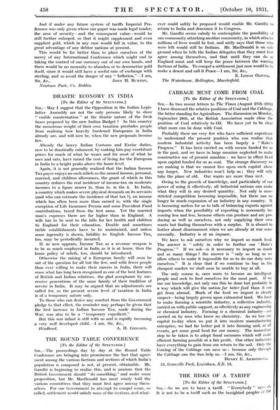CABBAGE MUST COME FROM COAL
[To the Editor of the SPECTATOR.] SIR,—In two recent letters to The Times (August 27th-29th) I have discussed the relative positions of Coal and the Cabbage, the latter standing for Agriculture. The discussion on Monday, September 28th, at the British Association made clear the position of Coal relatively to Oil. We have yet to be clear what more can be done with Coal.
Probably there are very few who have sufficient experience to understand the present position who can realize that modern industrial activity has been largely a " Rake's Progress." It has been carried on with means funded for us in the past, and we have in large meaiure neglected to make constructive use of present sunshine : we have in effect lived upon capital funded for us as coal. The strange discovery we are making is that we cannot live upon • such capital alone any longer. New industries won't help us ; they will only take the place of old. Our wants are more than met.
Owing to the growth of knowledge, and particularly of our power of using it effectively, all industrial nations can make what they will in any desired quantity. Not only is unre- stricted competition becoming impoSsible, but there can no longer be much expansion of an industry in any country. It is becoming useless for us to talk of balancing exports against imports when the possibility of exporting is necessarily be- coming less and less, because others can produce and are pro- ducing as well as ourselves, not only supplying their own wants but finding themselves with a surplus. It is absurd to bother about disarmament when we are already at war com- mercially. Industry is at an impasse.
We have to ask ourselves why we import so much food. The answer is solely in order to further our Rake's Progress.' " If we ask—is it necessary to import so much and so many things ? the answer is " only so long as we allow others to make it impossible for us to do. our duty unto ourselves." It is clear that if we continue to buy in the cheapest market we shall soon be unable to buy at all.
The only course is, once more to become an intelligent people and seek to feed ourselves for the most part. If we use our knowledge, not only can this be done but probably in a way which will give the nation far better food than it can get from abroad. Much of the food we import is clearly suspect—being largely grown upon exhausted land. We have to make farming a scientific industry, a collective industry, carried on with public support, as effectively as any engineering or chemical industry. Farming is a chemical industry—yet carried on by men who know no chemistry. As we lose our capital to-day when we put it into modern manufacturing enterprise, we had far better put it into farming and, at all events, get some good food for our money. The immediate step to be taken is to adopt fiscal measures which will make efficient farming possible at a fair profit. Our other industries have everything to gain from our return to the soil. Only the Coming of the Cabbage can save us : because only through the Cabbage can the Sun help us.—I am, Sir, &c., HENRY E. ARMSTRONG.
55, Granville Park, Lewisham, S.E. 13.


















































 Previous page
Previous page